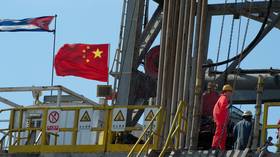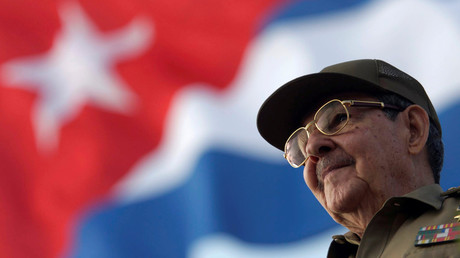China’s newest oil hotspot is in America’s backyard
Published time: 19 Apr, 2019 11:17

China is ramping up its oil drilling initiative in Cuban waters, using cutting-edge technology to reach deposits that Cubans couldn’t touch.
Chinese state-run news agency Xinhua said on Tuesday that an affiliate of Chinese oil major CNPC, Great Wall Drilling, was drilling for oil off Cuba’s coast as part of a joint venture with state-owned oil firm Cuba Petroleum Company (CUPET).
"Our deposits extend out to sea, so increasingly, wells are longer and to reach them we need cutting-edge technology that we have accessed through the Great Wall Company," Julio Jimenez, CUPET's director of drilling, told Xinhua.
The site of the drilling operation is reportedly near the coastal town of Boca de Camarioca, about 75 miles east of Havana, and is a 1,475-meter-deep well extending some 4,692 meters out to sea. Workers hope to reach 6,950 meters where geological studies show a hydrocarbon deposit is located. Great Wall management claims that several new wells have been drilled more effectively using Chinese drilling technology.
"We have increased the efficiency of drilling, lowered the cost of building the wells, and drilled several highly productive wells, in addition, we have supported the finding of new deposits," said Meng Fanji, Great Wall’s deputy manager.
The Chinese company, which first signed deals to explore for oil in Cuba in 2005, is also working on another exploration well in Celimar, about nine miles east of Havana. The Celimar well is 2,141 meters deep and, after reaching an angle of 79 degrees, runs for 5,100 meters out to sea. The objective is to reach a crude deposit estimated to lie 6,300 meters offshore, Xinhua added.
ALSO ON RT.COMCuba's new president reaches out to old allies Russia & China, seeking trade deals
Cuba desperately needs new oil to help meet its energy needs. Unlike many of its other neighbors in the region, the one-party state uses crude oil to meet around half of its energy needs, while it relies on foreign imports, often Venezuelan crude along with generous subsidies, for the rest.
Fighting against sanctions together
In a statement that shows how oil and geopolitics often intersect, even in the Caribbean, Venezuela's Foreign Minister Jorge Arreaza said on April 9 that his country would “fulfill its commitments” to Cuba despite US sanctions targeting oil shipments from the South American country to its ideological ally.
Arreaza said he would not reveal Venezuela’s “strategy,” but that the sanctions would not stop the shipments. “When the conventional power of capitalism attacks you, you have to know how to respond through non-conventional means, always respecting international law,” Arreaza told reporters.
The Trump Administration hasn’t only taken a tougher stance with Venezuela than his predecessors, leveling crippling sanctions against the country’s president Nicolas Maduro in efforts to remove him from power, it has also renewed tensions with Cuba in the aftermath of President Obama’s warmer ties with the country.
In November, Cuba criticized the Trump administration for putting new sanctions against more than two dozen Cuban companies, in a move that Havana said was a futile attempt to change its policies, which would only isolate Washington further internationally.
Though the US coast is less than 100 miles from Cuba, American companies are prohibited from owning any Cuban oil or gas assets due to the decades-long trade embargo put in place against the country by Washington.
However, according to the US Energy Administration (EIA) US oil companies are allowed to participate in drilling as well as sending technology and supplies with an executive license in Cuba. Other countries as well as China, including Russia and Australia, have explored for oil in waters off the country’s coast.


0 Comments:
Post a Comment
Subscribe to Post Comments [Atom]
<< Home